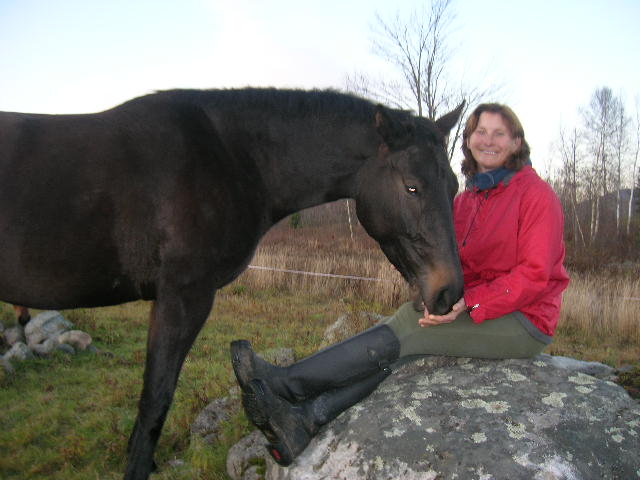Throughout my time with my horses, I’ve wanted not only to learn how to ride well but also to understand how a horse thinks and feels about things, and what it means to be a member of the herd. I wanted to be welcomed into their world, learn how to communicate with my horses, and be part of their lives but not change their way of living. It wasn’t that way entirely at first. At first my ambition was to win blue ribbons.
My learning journey was kick started at a Powwow. The Abenaki people are native to northern New Hampshire where I live. One August morning as I was shopping in my small town soon after moving here and acquiring the first of my horses, I saw a poster on a storefront that said there was to be a Powwow at the local fairgrounds. I knew I had to go and try to learn something about horses at the Powwow.
This was certainly the first Powwow I ever attended. Members of the Abenaki tribe still live not far from my home. As I observed the ceremonial dancers, I found myself rubbing elbows with some spectators, and tentatively broached the subject of horses and expressed my curiosity as to the way their ancestors had trained and communicated with their horses. To my delight, I was led to one of the elders of the tribe. I felt as if I was in an old cowboy movie playing my part as the likeable greenhorn.
After I sat next to the old man and answered his questions, he lifted his hand and called over a young man who was very handsome in his traditional attire. His black eyes looked right into mine. I was mesmerized by his painted face as he told me his ancestors took a lot of pride in the way they trained their horses and that his ancestors had passed this skill on to him. His family had a tradition of traveling to hold Powwows and clinics on training horses the Native American way.
His most important lesson to me that day was that our relationship with horses must begin with understanding the relationship we have with the entire animal kingdom. He explained to me a concept which translates to “I am related to everybody.” The handsome young Indian spoke to me about how we are truly related to everyone, all the animals, especially horses, but always in a certain meaningful order. He said we can make this earth healthier by respecting the animals and their right to their place in it, the planet we all live on together.
That day I learned about the basics of “relationship training.” I learned not some method but a foundational attitude and a wisdom that has stood me in good stead with my horses and added something to my life. His point was that all training begins with the relationship between horse and human more than to achieve results of any kind. One must start with respect for the horse, learn about and even follow the horse, he told me. I was hearing it from someone whose whole way of life and even religion were involved in this attitude.
At first when I started out with my horses, I had my sights set on the show ring, and this mission in the earlier years with my horses clouded my vision. The show ring was a worthy ambition, but it’s not everything nor should it be the first thing. I began to feel something was missing in my program, and I already had a hunch about it before the Powwow.
The young Abanaki emphasized to me that the most important part of the relationship with your horse is leadership. He told me I needed to be leader of the herd, that is, my little family of horses. Relatedness is not a free-for-all. He spoke from his heart when he told me that herd leadership is the highest status a person holds among his horses, and that with this status comes the understanding that maintaining it is a prime responsibility. It allows one to take care of the horses first, then oneself, and then the farm’s harmony. This wisdom was emphasized to me that day such that I have never forgotten to always try to put it into practice.
Leadership in a herd relationship has to be earned and maintained. Every day my horses test me to make sure I can maintain my status as herd leader. I have been maintaining this leadership for the last twenty years. At the Powwow, I formed the spiritual basis for this as something necessary and moreover worthwhile to do. On my farm, we are all related and even equal but there always has to be a leader. You, the horse owner, should be in charge, and it is a sacred responsibility. If the owner fails on the job the results could be sad and dire. Basically it is caring for your horse the best way you can and in a way that they understand. Horses know that you know what is best; that is, they know it if you do. After that there is love and respect, and training and development.
It was hard for me to say goodbye to the young man, and the elder, and leave the Powwow. I always reflect back and appreciate the short but intense moments we had. I am grateful for the wisdom he shared with me, and my horses have benefited. I think the basic point the young Native American horseman made to me was to always speak to my horses every day and listen to what they have to say to me, their leader.








